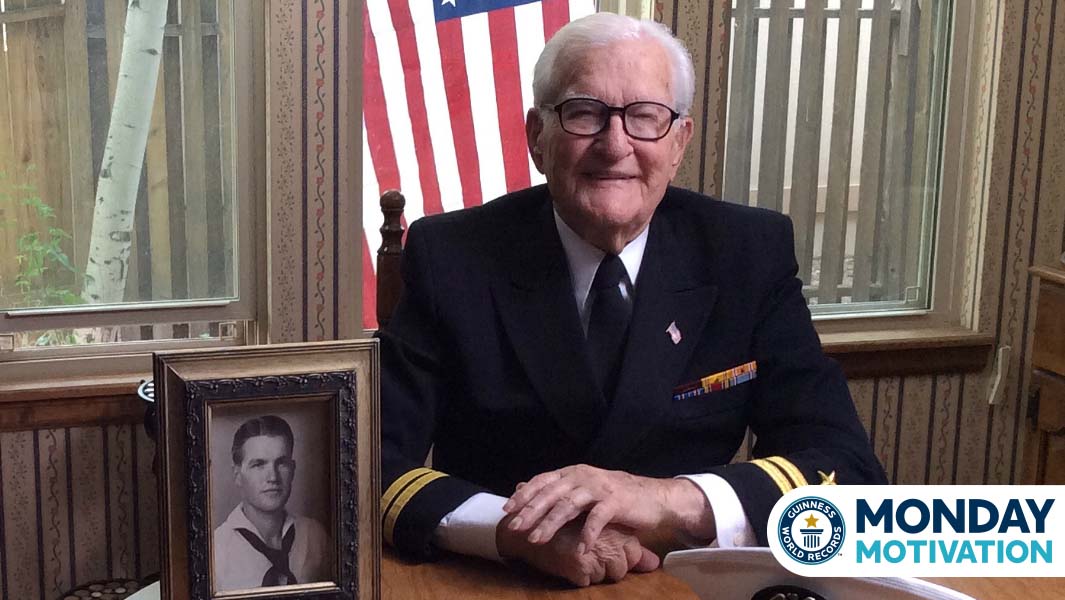Monday Motivation: The Pearl Harbor hero who’s now a record-breaking author

On 7 December 7 1941, the United States experienced one of its most defining moments in history: the attack on Pearl Harbor.
A day of sadness, fear, and chaos – that early Sunday morning marked the unforgettable time that the Japanese attacked the Hawaiian naval base, forcing America to enter World War II.
In total, 2,403 men and women were killed during the surprise attack, with thousands more left to recover from terrible injuries and acute burns.
Though many were sadly unable to recount their experience from that fateful incident, Naval Lieutenant Jim Downing currently lives on to tell the tale.

The 104-year-old veteran, who has now become the world’s Oldest male author, has written his latest work on his firsthand experience of the day.
Upon hearing those words, Jim sat frozen at the table; stunned by the news that had rung out from the local station.
For the last ten years the United States Navy had been the only home Jim had known - and now it was up in smoke.

After the Great Depression had hit in the early 1930s, most American families were struggling to survive the financial downturn; Jim who was determined to find a way out of the deficit, leaving his home in Montana seeking an opportunity to make a living.
Without much choice Jim opted to serve his country, but quickly grew accustomed to the naval culture and lifestyle.
He was stationed aboard the USS West Virginia, where he worked his way up the ranks to become a Gunners Mate 1st class and postmaster worker.
Though the role as the ship’s mailman seemed less militant than his duties as a Naval gunman, it was not by any means less significant.
By wandering the ship door-to-door, face-to-face, Jim got to know his fellow combatants well; resulting in many friendships, memories, and an irreplaceable sense of familiarity in his daily work.

So on the morning of 7 December, when Jim heard that the faces he had come to know were now being besieged, he didn’t think twice before running into the line of fire.
Jim and his fellow naval officers had arrived to Pearl Harbor naval base in sheer uproar.
Barely cheating death, Jim quickly recovered from a near fatal confrontation with a Japanese fighter pilot to assist in the battle.
Not only were countless boats dipping quickly into the water, which was filled with casualties, debris, and provisions, but several Japanese fighter planes circled closely overhead – threatening to increase the damage that had already been done to the Pearl Harbor base.

Fearlessly, Jim decided to take matters into his own hands once throwing himself aboard the USS West Virginia.
His fellow men had split up to help where they could, but given that a majority of ships were already half underwater, the loss of power meant that guns aboard were no longer working.
But the most prominent threats posed to the young lieutenant were the massive flames which engulfed the vessel.

While under attack Jim tried to act fast to prevent the USS West Virginia from being damaged further and exploding, as fighter plane bullets and the unruly fire threatened to hit the ship’s weaponry.
“I borrowed a fire hose from the ship we were tied up to and tried to keep the fire away from live ammunition. But while I was doing that I saw bodies lying around. A thought that ran through my mind at the time was ‘their parents will never know exactly what happened to them'.
For two terrifying hours, Jim went around memorizing names for all of his fallen men while holding the water hose at impending flames.
Even though Jim was performing a number of heroic acts to ensure the ship did not crumble like the USS Arizona, which received the worst of the attack that day, his main concern was traced back to his duties as a postmaster: delivering a sense of news and resolve to the people who needed it most.
That mentality continued later that day as the flames had settled and the Japanese retreated back to their home territory.
Jim gave many families the ultimate gift of closure, at a time in history where many deaths were reported without any cause or explanation.
He received a few letters back from the soldier’s kin he had written to, thanking him for his sacrifice.

Jim lost 35 of his close friends from the attack on Pearl Harbor, unfortunately witnessing some of their horrific deaths.
As a result, he went on to fight in the Korean War, the Cold War, and even became involved with initial testing of the hydrogen bomb, eager to serve his country and brave the attacks of foreign nations as he did on Hawaiian shores.
But despite years of service and memories made after his survival of Pearl Harbor, he never did forget that day, and decided to record his document his memories from that experience to share with his children.

After one publisher picked up his manuscript in 2015, Jim Downing who displayed the epitome of valor on 7 December 1941, had officially become the world’s oldest author at the age of 102 years and 176 days – his final draft titled 'The Other Side of Infamy'.
On becoming a record holder, among other respected titles, Jim said:
After surviving the siege of Pearl Harbor, Jim lived a long life, becoming a respected war hero.

Eager to share his memories so that America’s youth will learn and keep the country strong.


